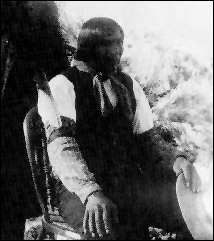

Wovoka was the Paiute mystic whose religious pronouncements spread the Ghost Dance among many tribes across the American West.
Wovoka was born in Western Nevada, in what is now Esmeralda County, in about 1856. Little is known about his early life, but at about 14 his father died, leaving Wovoka to be raised by the family of David Wilson (a nearby white rancher). Wovoka soon took the name Jack Wilson, by which he was broadly known among both neighboring whites and Indians. He learned to speak English and apparently had a fair amount of contact with Christianity.
At about 30, Wovoka began to weave together various cultural strains into the Ghost Dance religion. He had a rich tradition of religious mysticism upon which to draw. Around 1870, a northern Paiute named Tavibo had prophesied that while all whites would be swallowed up by the earth, all dead Indians would emerge to enjoy a world free of their conquerors. He urged his followers to dance in circles (already a tradition in the Great Basin area) while singing religious songs. Tavibo's movement spread to parts of Nevada, California, and Oregon.
Wovoka began to make similar prophecies. His pronouncements heralded the dawning of a new age in which whites would vanish, leaving Indians to live in a land of material abundance, spiritual renewal, and immortal life. Like many visions, Wovoka's prophecies stressed the link between righteous behavior and imminent salvation. Salvation was not to be passively awaited, but welcomed by a regime of ritual dancing and upright moral conduct.
Despite the later association of the Ghost Dance with the Wounded Knee Massacre and unrest on the Lakota reservations, Wovoka charged his followers to: "not hurt anybody or do harm to anyone. You must not fight. Do right always...Do not refuse to work for the whites and do not make trouble with them."
The slaughter of Big Foot's band at Wounded Knee Creek in 1890 was cruel proof that the white man was not about to simply vanish, and that the millennium was not at hand. Wovoka quickly lost his notoriety and lived as Jack Wilson until sometime in 1932.
